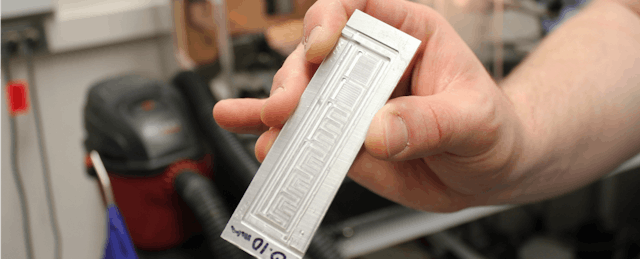“Who else gets to play with lasers all day?” asks engineer John Ford against the background of a high-pitched beep-beep-beep and whirring of machinery. Ford gestures to a laser he programed to cut a series of holes that are two microns in diameter—about one-fifteenth the thickness of a human hair—into a six-inch glass plate.
Ford works at Potomac Photonics, a Baltimore-based manufacturing company specializing in making extremely precise parts for medical, biotech, aerospace, and electronic devices. The plates he is laser-carving in Potomac’s laboratory today will become part of a tool for cell-discovery research.
Ford is one of many Potomac employees also enrolled in classes at the Community College of Baltimore County. The college has its own Digital Fabrication Laboratory, or Fab Lab, where inventors, entrepreneurs, teachers, students, and community members can bring their ideas to life with equipment including laser cutters and a 3D printer.
The college’s Fab Lab offers an associate’s degree in Design, Fabrication, and Advanced Manufacturing, and students can participate in a paid internship program with Potomac, where they work at the company once a week, putting their knowledge to use in a commercial environment and developing their workforce skills.
Potomac has hired many of the college’s graduates and past interns. “It’s very hard to find workers with backgrounds in manufacturing,” says Potomac president and CEO Mike Adelstein.
He says the hires they have made through the internship program have “made a huge difference in the ability of our company to grow and expand.”
And Adelstein sends many of his employees to take classes at the Community College of Baltimore County to expand their skills. It’s real-world training, so graduates can immediately come out and make a difference in the workforce, he says.
It’s a model the college wants to grow. “We need to look at community colleges as a way to get into career paths,” says Ken Burch, director of the college’s Technology and Innovation in Manufacturing and Engineering Center.
But the biggest challenge is generating interest among high school graduates, say the program’s leaders. “Unfortunately, there aren’t many high school pathways or programs that lead you into manufacturing,” Adelstein says.
Of the 3.5 million estimated manufacturing jobs that will become available over the next decade, 2 million are predicted to go unfilled due to a shortage of a skilled workforce, according to a Deloitte study. There are other contributing factors, according to the study: Today’s traditional students having a negative image of the manufacturing sector, workers lacking STEM skills, and there has been a gradual decline of technical education programs in public high schools.
Leaders of the Fab Lab see collaboration between local schools, businesses, and community colleges as key to filling this gap.
Seeing Manufacturing in a New Light
The Fab Lab is open to public use, pending a safety and operating certification, anda new program offers college credit to high school students who come into the lab a few times a week, turn in a portfolio, and take an exam.
“We try to create a connection by bringing students into the lab and generating interest so they want to continue with the college program,” Burch says. “Not only is this a lab you can use, this is a lab you can earn a degree in.”
Engineering today is an increasingly creative field. Many Fab Lab students that Potomac hires have a background in the arts, including degrees in interior design and graphics.
Potomac encourages creativity and invention, and has an innovation lab where employees develop and construct much of the machinery used in manufacturing product for clients.
Burch says there’s been plenty of interest in the Fab Lab and the equipment available for use there, but fewer students have been willing to commit to the degree program.
“I think there’s a perception out there in regards to manufacturing where parents want their kids to become a lawyer or go work on Wall Street,” Adelstein says. “That’s a perception we need to change.”
Over the next three years, Burch wants to focus on marketing the Fab Lab’s program and partner with new and emerging companies. “This,” he says, “is the new manufacturing world.”


